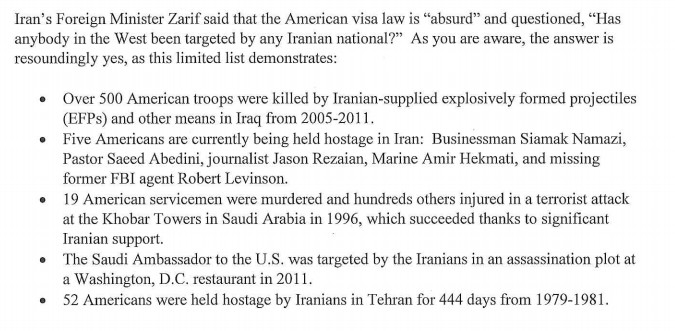The chairman of the House Committee on Homeland Security is the latest in a growing number of Congressional leaders to criticize the Obama administration for saying that it would circumvent newly-passed visa laws to address Iranian concerns and threats.
Secretary of State John Kerry wrote a letter last week to Iranian Foreign Minister Mohammad Javad Zarif, saying that in response to Iranian claims that portions of the law would violate the nuclear deal, the U.S. could waive the provisions of the law that refers to Iran as a sponsor of terror. In response, Rep. Michael McCaul (R – Texas), the chairman of the Homeland Security committee since 2013, told USA Today Tuesday that the Obama administration’s “continued capitulation to Iran continues to reach new lows.” (Yesterday the Tower reported that a letter advanced by Rep. Robert Dold and signed by 20 House members, including the chairmen of two key committees, described Kerry’s letter to Zarif as “beyond belief.”)
The legislation, which was passed as part of the omnibus bill with bipartisan support and was signed into law by President Barack Obama, restricts the automatic granting of visas to individuals who have traveled to countries that have a high risk of terror involvement, like Iran. Zarif complained over the weekend that the visa restrictions were a new sanction on Iran, which he believed would violate the nuclear deal. (The deal, formally known as the Joint Comprehensive Plan of Action or JCPOA, prevents the United States from placing new sanctions on Iran in response to nuclear work, but the U.S. can still sanction Iran for its sponsorship of terrorism, as Kerry has repeatedly stated). Kerry reassured Zarif that he is “confident that the recent changes in visa requirements passed in Congress, which the Administration has the authority to waive, will not in any way prevent us from meeting our JCPOA commitments.” McCaul responded after the letter was made public that “Iran is the world’s largest state sponsor of Islamist terrorism, and our message to them is clear: as long as you fuel networks of terror, individuals of your country will not be allowed to enter ours without closer scrutiny.”
McCaul’s comments came the same day that twenty members of Congress, including the chairs of the House Ethics Committee and the House Oversight and Government Reform Committee, signed a letter authored by Rep. Robert Dold (R – Ill.) that criticized the administration for its willingness to circumvent the law, saying that it was “beyond belief” that Iranian concerns “would supersede a newly-enacted U.S. law designed to protect the American people from terrorism.”
Rep. Mike Pompeo (R-Kan.) joined the chorus of opposition in a second letter, writing that the visa law update was an important effort to strengthen national security. “For Secretary Kerry to pander to Iran’s Foreign Minister, as it appears he did when he promised to waive U.S. visa restrictions regarding Iran, is wrong and dangerous,” he wrote. “The largest state sponsor of terrorism shouldn’t get to dictate U.S. visa policy. The urgent need to prevent ISIS and other terrorists from entering the U.S. ranks far above President Obama’s nuclear agreement.”
Pompeo also noted that Zarif had claimed in his comments about the law that Iran had never targeted Americans. Pompeo’s letter corrected the historical record.
Pompeo’s complete letter is available here (.pdf).
Iran has reiterated that it would consider the visa restrictions to be a violation of the nuclear deal. “If the Congress law is implemented as it is, it would definitely be a breach” of the deal, Zarif said at a press conference. Deputy Foreign Minister Abbas Aragchi was quoted by state TV as saying that he was willing to take the issue to the joint commission that oversees the implementation of the nuclear deal.
At a hearing on the nuclear deal in July, Kerry told Sen. Jeff Flake (R – Ariz.) that Iran had agreed that non-nuclear sanctions would not be prohibited by the nuclear deal.
We’re not going to come back and just slap [sanctions] on again, but that absolutely does not mean that we are precluded from sanctioning Iranian actors, sectors, as any actions or circumstances warrant. So all of our other sanctions authorities remain in place, they are unaffected by this agreement, and Iran only said, if you read what it says, that they would treat the imposition of new nuclear related sanctions as the grounds to cease performing. But they are clear and we are clear that we have all other kinds of authorities and let me specific on that because it’s important for this whole debate to be clear.
[Photo: soccerdhg / Flickr ]





